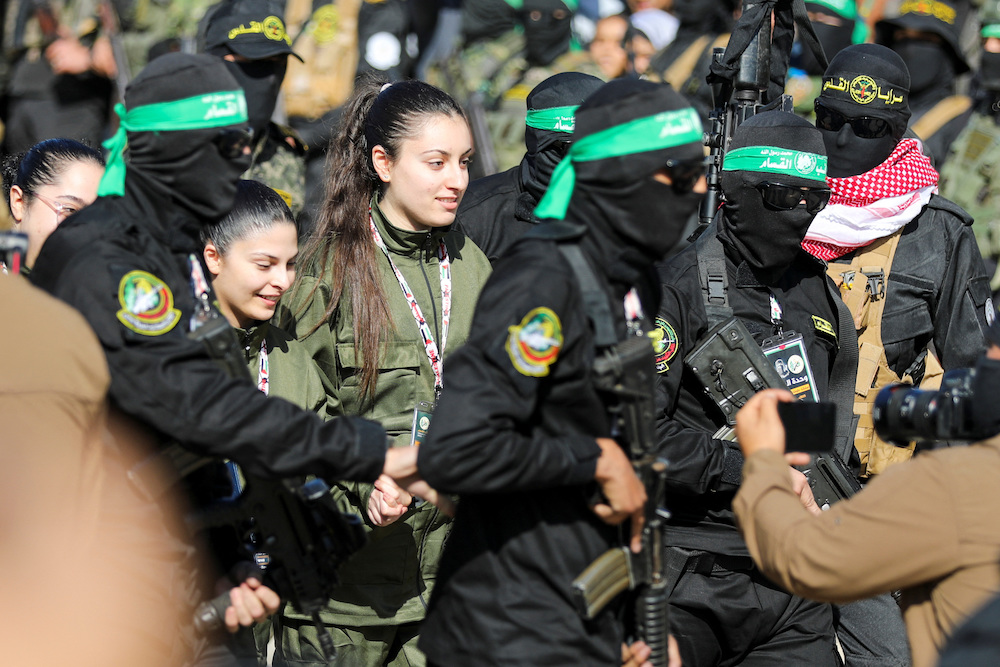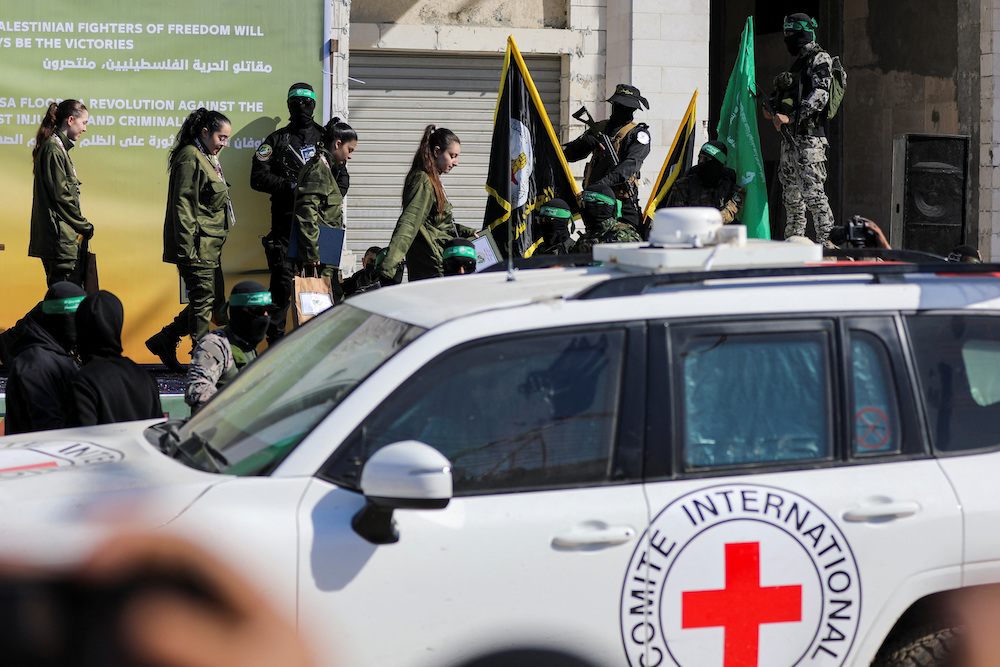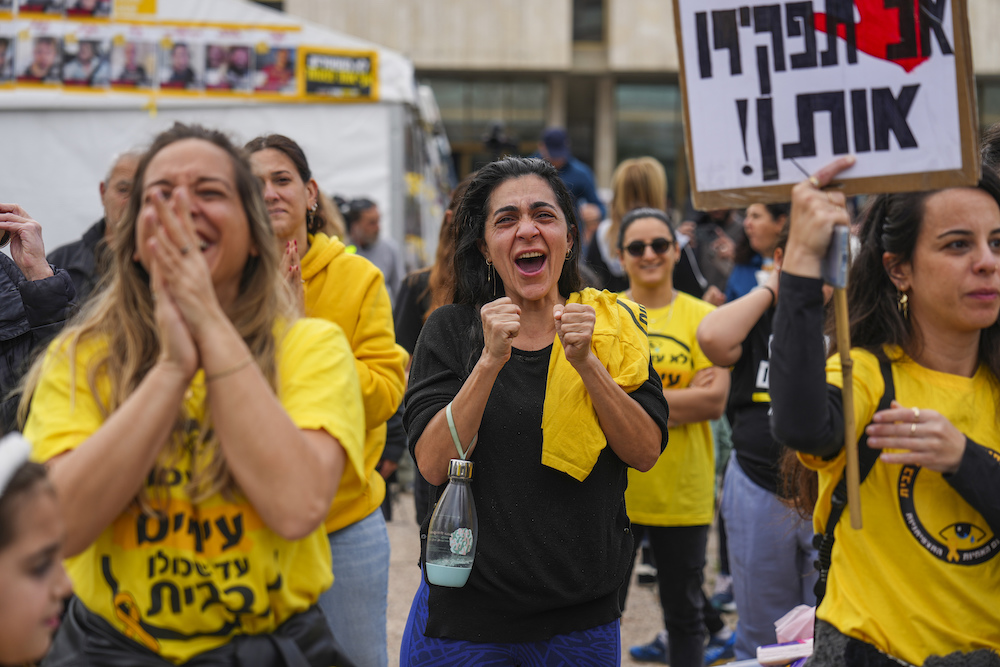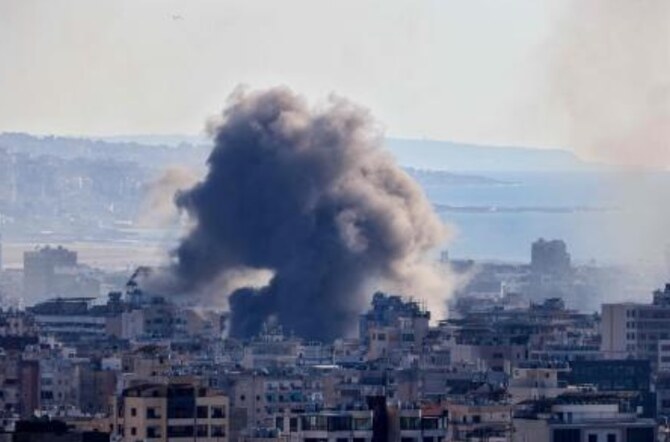BEIRUT: Israeli jets on Saturday pounded Haret Hreik in southern Beirut as Hezbollah announced it had targeted the residence of Israeli Prime Minister Benjamin Netanyahu using drones.
Avichay Adraee, the Israeli military spokesman, warned residents of Haret Hreik to evacuate before the area was struck.
An Israeli target map included the building of the Islamic Charitable Emdad Committee affiliated with Hezbollah.
The area has been hit with consecutive days of airstrikes over the past three weeks, with residents evacuating in the wake of the assassination of Hezbollah chief Hassan Nasrallah on Sept. 27.
Fighting between the Israeli army and Hezbollah entered a new phase on Saturday with the Israeli announcement that drones had been launched at Netanyahu’s home in Caesarea, south of Haifa.
Meanwhile, Israeli expanded its air campaign against Hezbollah to new areas, including Chtaura in central Bekaa and the coastal town of Jounieh in Mount Lebanon.
The development in Caesarea was kept under wraps for some time, with three drones said to have crossed into Israel from Lebanon in the morning.
Israel blamed Hezbollah for the attack, though the party has yet to claim responsibility.
One drone crashed in Caesarea, where Netanyahu owns a private residence.
Netanyahu’s office said: “A drone was launched toward his home in Caesarea, but the prime minister and his wife were not there, and no injuries were reported.”
The Israeli Broadcasting Corporation said that the drone “flew 70 km from Lebanon and directly hit a building in Caesarea,” while Israeli media reported that “shrapnel hit a nearby building.”
In an official statement, the Israeli army acknowledged that it “detected three drones crossing from Lebanon into Israeli territory, two of which were intercepted.”
The military operations room of Hezbollah a day earlier had announced a “transition to a new and escalatory phase in the confrontation with the Israeli enemy.”
This would “be reflected in the developments and events of the coming days,” it added.
In August this year, Hezbollah released footage captured by an observer drone that had infiltrated Israeli airspace, showing Netanyahu’s residence in Caesarea.
Meanwhile, an Israeli military drone on Saturday struck a residential apartment in the Qataya building in Chtaura at 5 a.m, killing one man and injuring two other people.
A reporter, who requested to remain anonymous, told Arab News that the dead man was affiliated with Hezbollah, “but we are unaware of his military rank.”
Hours later, another Israeli military drone tracked a vehicle traveling from northern Lebanon toward Beirut along the Jounieh highway.
It launched a missile at the car but missed, before firing a second missile that prompted the driver to flee the vehicle with his wife.
The pair ran into a nearby forest but were struck by the drone and killed.
Initial reports suggested that they were from the Al-Burj Al-Shamali area in southern Lebanon.
The Al-Hadath TV channel reported from sources that the target was a “military leader in Hezbollah’s intelligence.”
The Ministry of Health said: “The Israeli airstrike on a vehicle in Jounieh resulted in the deaths of two individuals.”
The Israeli army previously employed the same drone-launched missile during the assassination of a driver in the Kahala area three weeks ago.
The target was killed as his family, who accompanied him in the vehicle, were left unharmed.
Eyewitnesses at the time described the incident as a “silent targeting.”
The assassination on Saturday caused significant confusion in Jounieh, a Christian area with no Hezbollah presence, and which has rarely drawn Israeli attention.
Israeli airstrikes intensified in the southern region and the Bekaa, coinciding with Hezbollah’s targeting of northern Israel.
The strikes on western Bekaa killed Haidar Shahla, the mayor of Sohmor, after a raid targeted the town of Baaloul.
In southern Lebanon, Israeli jets raided the surroundings of a building previously used by the demining organization “MAG” in Kfar Joz in Nabatieh, as well as Chkeif, Kfarkila and Srifa.
Kfarshouba, Khiam and the Marjayoun valley were targeted by Israeli artillery.
A raid targeted and completely destroyed a building on the Zefta-Nabatieh highway, while other raids struck the town of Ebba.
A raid on a building in Jal Al-Bahr, Tyre, near a medical center, injured six people, one critically. The targeted region includes commercial shops, medical clinics and residential buildings.
A raid on Kharayeb injured three civilians.
Meanwhile, ground fighting continued in the border region, notably on the outskirts of Aita Al-Shaab, Ramieh and Kafra, where violent clashes are taking place for the third consecutive day.
In Bekaa, Israeli raids reached the town of Khodor in western Bekaa, Mecherfeh on the northeastern border of Hermel, Bouday, the barrens of Shmistar, the surroundings of Qasr and Hosh Sayyid Ali in Hermel on the Syrian border.
In a series of statements, Hezbollah announced that it targeted Safed, Haifa, Israeli military bases and gatherings in Rosh Pinna, east of the Malkia settlement, and Jal Al-Deir, northeast of the Avivim settlement.
Hezbollah also said that it launched “a swarm of attack drones” toward the Ein Shemer base of Israel’s air force, as well as a regional brigade base east of Hadera.
Israel’s Channel 12 reported that “several missiles landed in Tiberias and its lake,” adding that “three drones were fired from Lebanon toward Nahariya, Akka and the Haifa Bay, one of which was intercepted by the Israeli army.”
Israeli jets pound Haret Hreik as Netanyahu’s home targeted in drone attack
https://arab.news/cjrzt
Israeli jets pound Haret Hreik as Netanyahu’s home targeted in drone attack

- Avichay Adraee, the Israeli military spokesman, warned residents of Haret Hreik to evacuate before the area was struck
- An Israeli target map included the building of the Islamic Charitable Emdad Committee affiliated with Hezbollah
Israel blocks Gazans’ return to territory’s north unless civilian woman hostage freed

- ‘Israel will not allow the passage of Gazans to the northern part of the Gaza Strip until the release of civilian Arbel Yehud’
“Israel will not allow the passage of Gazans to the northern part of the Gaza Strip until the release of civilian Arbel Yehud, who was supposed to be released today, is arranged,” Prime Minister Benjamin Netanyahu’s office said.
Israeli military spokesman Rear Admiral Daniel Hagari said, “Hamas did not comply with the agreement on its obligation to return civilian females first.”
Two Hamas sources said that Yehud was “alive and in good health.”
A Hamas source said that she will be “released as part of the third swap set for next Saturday,” February 1.
Earlier on Saturday four Israeli women soldiers held captive in Gaza were released by Hamas and Islamic Jihad.
Hamas frees four Israeli hostages to Red Cross in Gaza

- Israel releases 70 Palestinian prisoners into Egyptian side of the Rafah border crossing
- The hostage-prisoner exchange is part of a fragile ceasefire agreement between Israel and Hamas
GAZA CITY, Palestinian Territories: Hamas militants on Saturday handed over to the Red Cross four Israeli women hostages under a truce deal in the Gaza war that is also expected to see a second group of Palestinian prisoners freed.
An AFP journalist witnessed the handover after the four were presented on a stage at a main square in Gaza City, where dozens of masked, armed militants had gathered earlier.
The Israeli military later confirmed they have received the freed hostages.
Four Red Cross vehicles had arrived ahead of the handover.
The fighters from Hamas and Islamic Jihad, carrying assault rifles and rocket-propelled grenade launchers, gathered in rows, many carrying their groups’ banners and wearing green headbands, as crowds of Gaza residents gathered to watch.
Israel confirmed Friday that it had received a list of the hostages’ names.
Egypt’s state-run Qahera TV meanwhile reported Israel has released 70 Palestinian prisoners into Egypt under the Gaza ceasefire deal. The network said they arrived at the Egyptian side of the Rafah border crossing with the Gaza Strip.
On Saturday, Palestinian sources said Israel is to free 200 Palestinian prisoners in exchange for the hostages.

According to the Israeli Hostage and Missing Families Forum, a campaign group, the women released are Karina Ariev, Daniella Gilboa, Naama Levy — all aged 20 — and Liri Albag, 19.
They had been held captive for more than 15 months, since Hamas’s October 7, 2023 attack on Israel.
Palestinians displaced by the war to southern Gaza should be able to begin returning to the north following Saturday’s releases, Bassem Naim, a member of Hamas’s political bureau based in Qatar, told AFP on Friday.
The truce has also led to a surge of food, fuel, medical and other aid into rubble-strewn Gaza but Israel’s UN ambassador on Friday confirmed that the UN agency for Palestinian refugees, Gaza’s main aid agency, must end all operations in Israel by Thursday.
The hostage-prisoner exchange is part of a fragile ceasefire agreement between Israel and Hamas that took effect last Sunday, and which is intended to pave the way to a permanent end to the war.
Mediators Qatar and the United States announced the agreement days ahead of US President Donald Trump’s inauguration. Trump has since claimed credit for securing the deal after months of fruitless negotiations.
Abu Obeida, spokesman for the Ezzedine Al-Qassam Brigades, Hamas’s armed wing, said on Telegram Friday that “as part of the prisoners’ exchange deal, the Qassam brigades decided to release tomorrow four women soldiers.”
Israeli Prime Minister Benjamin Netanyahu’s office confirmed it had received the names through mediators.
According to Israel’s prison service, some of the Palestinians released will go to Gaza, with the rest returning to the Israeli-occupied West Bank.
The ceasefire agreement should be implemented in three phases, but the last two stages have not yet been finalized.
“The worry and fear that the deal will not be implemented to the end is eating away at all of us,” said Vicky Cohen, the mother of hostage Nimrod Cohen.

In Gaza, families displaced by more than a year of war longed to return home, but many will find only rubble where houses once stood.
“Even if we thought about returning, there is no place for us to put our tents because of the destruction,” Theqra Qasem, a displaced woman, said.
During the first, 42-day phase that began Sunday, 33 hostages Israel believes are still alive should be freed in staggered releases in exchange for around 1,900 Palestinians held in Israeli jails.
Three hostages — Emily Damari, Romi Gonen and Doron Steinbrecher — returned home on the first day of the truce.
Ninety Palestinians, mostly women and minors, were released in exchange.
The deal’s second phase is to see negotiations for a more permanent end to the war, but analysts have warned it risks collapsing because of the deal’s multi-phase nature and deep distrust between Israel and Hamas.
During their October 7, 2023 attack, Hamas militants took 251 hostages, 91 of whom remain in Gaza, including 34 the Israeli military has confirmed are dead.
The attack resulted in the deaths of 1,210 people, mostly civilians, according to an AFP tally based on official Israeli figures.
Israel’s retaliatory response has killed at least 47,283 people in Gaza, a majority civilians, according to the Hamas-run territory’s health ministry, figures which the UN considers reliable.
Under the deal, the withdrawal of Israeli forces from Gaza’s densely populated areas is to allow for the exchanges as well as “the return of the displaced people to their residences,” Qatari Prime Minister Sheikh Mohammed bin Abdulrahman bin Jassim Al-Thani has said.
Almost the entire Gaza population of 2.4 million has been displaced by the war
According to the United Nations, by December 1, nearly 69 percent of buildings in the Gaza Strip had been destroyed or damaged, and the UN Development Programme estimated last year that it could take until 2040 to rebuild all destroyed homes.
Hundreds of truckloads of aid have entered Gaza daily since the ceasefire began, but the UN says “the humanitarian situation remains dire.”

The UN agency for Palestinian refugees, UNRWA, will be effectively barred from operating as of Thursday.
In a letter addressed to United Nations chief Antonio Guterres, Ambassador Danny Danon confirmed: “UNRWA is required to cease its operations in Jerusalem, and evacuate all premises in which it operates in the city, no later than 30 January 2025.”
UNRWA chief Philippe Lazzarini warned on social media platform X on Friday that preventing the agency from operating “might sabotage the Gaza ceasefire, failing once again hopes of people who have gone through unspeakable suffering.”
Lebanon army accuses Israel of ‘procrastination’ in ceasefire withdrawal

BEIRUT: Lebanon’s army accused Israel of procrastinating in withdrawing troops from south Lebanon as required under a ceasefire that ended the war with Hezbollah, a day after Israel said its forces would remain beyond a Sunday deadline for their departure.
The Lebanese army, in a statement issued on Saturday, also urged Lebanese residents to wait before heading into the border region, citing the presence of mines and unexploded Israeli ordnance.
Under the US-brokered agreement, which took effect on Nov. 27, Hezbollah weapons and fighters must be removed from areas south of the Litani River and Israeli troops should withdraw as the Lebanese military deploys into the region, all within a 60-day time frame, meaning by Sunday at 4 a.m. (0200 GMT).
Israeli Prime Minister Benjamin Netanyahu’s office said on Friday the terms had not been fully enforced by the Lebanese state. The White House said a short, temporary ceasefire extension was urgently needed.
The US-backed Lebanese army said it had continued to implement the plan to strengthen its deployment south of the Litani River since the ceasefire came into effect.
“Delays occurred in a number of the phases as a result of procrastination in the withdrawal by the Israeli enemy, which complicated the mission of the army’s deployment,” the statement said. The army “maintains its readiness to complete its deployment as soon as the Israeli enemy withdraws,” it added.
The ceasefire ended more than a year of hostilities which were triggered by the Gaza war and peaked in a major Israeli offensive against the Iran-backed Hezbollah, which uprooted more than a million people in Lebanon.
The Israeli government has not said how much longer its forces might remain in south Lebanon, where the Israeli military says it has been seizing Hezbollah weapons and dismantling infrastructure used by the Shiite armed group.
Hezbollah, which suffered major blows in the war, said on Thursday that any delay of Israel’s withdrawal would be an unacceptable breach of the deal and put the onus on the Lebanese state to act. Hezbollah said the state would have to deal with such a violation “through all means and methods guaranteed by international charters.”
Israel said its campaign against Hezbollah aimed to secure the return home of tens of thousands of people forced by Hezbollah rocket fire to leave their homes in northern Israel.
Yemen’s Houthi rebels unilaterally release 153 war detainees, Red Cross says

- However, the release follows the Houthis detaining another seven Yemeni workers from the United Nations
DUBAI: Yemen’s Houthi rebels unilaterally released 153 war detainees Saturday, the International Committee of the Red Cross said.
The Houthis had signaled Friday night they planned a release of prisoners, part of their efforts to ease tensions after the ceasefire in the Israel-Hamas war in the Gaza Strip.
However, the release follows the Houthis detaining another seven Yemeni workers from the United Nations, sparking anger from the world body.
The Red Cross said it “welcomes this unilateral release as another positive step toward reviving negotiations” over ending the country’s long-running war.
Gaza aid surge having an impact but challenges remain

- In final months before ceasefire, aid convoys were routinely looted by gangs, residents
- In central Gaza, residents say flow of aid has begun to take effect as prices normalize
JERUSALEM: Hundreds of truckloads of aid have entered Gaza since the Israel-Hamas ceasefire began last weekend, but its distribution inside the devastated territory remains an enormous challenge.
The destruction of the infrastructure that previously processed deliveries and the collapse of the structures that used to maintain law and order make the safe delivery of aid to the territory’s 2.4 million people a logistical and security nightmare.
In the final months before the ceasefire, the few aid convoys that managed to reach central and northern Gaza were routinely looted, either by desperate civilians or by criminal gangs.
Over the past week, UN officials have reported “minor incidents of looting” but they say they are hopeful that these will cease once the aid surge has worked its way through.
In Rafah, in the far south of Gaza, an AFP cameraman filmed two aid trucks passing down a dirt road lined with bombed out buildings.
At the first sight of the dust cloud kicked up by the convoy, residents began running after it.
Some jumped onto the truck’s rear platforms and cut through the packaging to reach the food parcels inside.
UN humanitarian coordinator for the Middle East Muhannad Hadi said: “It’s not organized crime. Some kids jump on some trucks trying to take food baskets.
“Hopefully, within a few days, this will all disappear, once the people of Gaza realize that we will have aid enough for everybody.”
central Gaza, residents said the aid surge was beginning to have an effect.
“Prices are affordable now,” said Hani Abu Al-Qambaz, a shopkeeper in Deir el-Balah. For 10 shekels ($2.80), “I can buy a bag of food for my son and I’m happy.”
The Gaza spokesperson of the Fatah movement of Palestinian president Mahmud Abbas said that while the humanitarian situation remained “alarming,” some food items had become available again.
The needs are enormous, though, particularly in the north, and it may take longer for the aid surge to have an impact in all parts of the territory.
In the hunger-stricken makeshift shelters set up in former schools, bombed-out houses and cemeteries, hundreds of thousands lack even plastic sheeting to protect themselves from winter rains and biting winds, aid workers say.
In northern Gaza, where Israel kept up a major operation right up to the eve of the ceasefire, tens of thousands had had no access to deliveries of food or drinking water for weeks before the ceasefire.
With Hamas’s leadership largely eliminated by Israel during the war, Gaza also lacks any political authority for aid agencies to work with.
In recent days, Hamas fighters have begun to resurface on Gaza’s streets. But the authority of the Islamist group which ruled the territory for nearly two decades has been severely dented, and no alternative administration is waiting in the wings.
That problem is likely to get worse over the coming week, as Israeli legislation targeting the lead UN aid agency in Gaza takes effect.
Despite repeated pleas from the international community for a rethink, the UN Relief and Works Agency for Palestine Refugees (UNRWA), which has been coordinating aid deliveries into Gaza for decades, will be effectively barred from operating from Tuesday.
UNRWA spokesman Jonathan Fowler warned the effect would be “catastrophic” as other UN agencies lacked the staff and experience on the ground to replace it.
British Foreign Secretary David Lammy warned last week that the Israeli legislation risked undermining the fledgling ceasefire.
Brussels-based think tank the International Crisis Group said the Israeli legislation amounted to “robbing Gaza’s residents of their most capable aid provider, with no clear alternative.”
Israel claims that a dozen UNRWA employees were involved in the October 2023 attack by Hamas gunmen, which started the Gaza war.
A series of probes, including one led by France’s former foreign minister Catherine Colonna, found some “neutrality related issues” at UNRWA but stressed Israel had not provided evidence for its chief allegations.
















